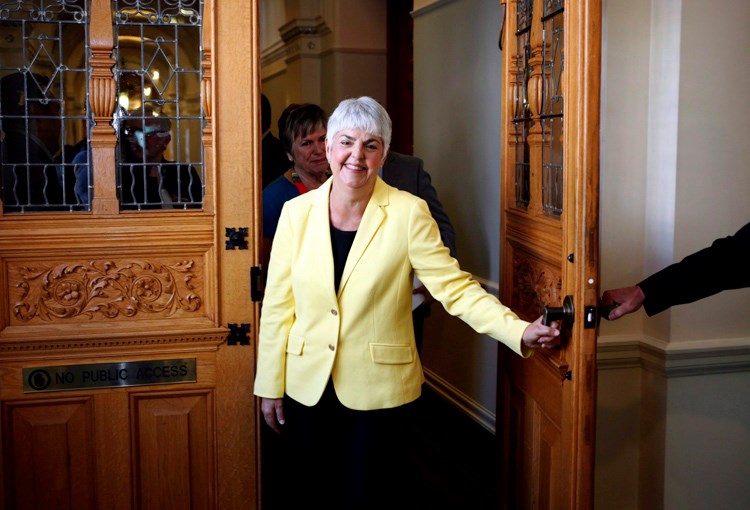VICTORIA — British Columbia has been pushed into a $12.5-billion deficit this year due to COVID-19, says Finance Minister Carole James.
James revealed the updated financial forecast Tuesday, saying the four-month pandemic has profoundly disrupted the pre-pandemic budget she had tabled in February.
“This could be the worst downturn experienced in our province in recent history,” said James.
B.C. had been forecasting a $227-million surplus this fiscal year, which began April 1 and ends March 31, 2021.
“Mere weeks after Budget 2020 was tabled our entire world changed,” said James.
She said it remains very difficult to present an exact forecast for the next year, and so instead the province is describing its estimates as a possible “scenario” for the future. That scenario assumes physical distancing remains in place, worldwide travel is curtailed and public health restrictions remain in place for the foreseeable future, said James.
Part of the deficit is attributable to $5 billion in COVID-19 spending the government earmarked to help with income, rent, health care and social relief during the state of emergency. That spending has actually grown to $6.2 billion, due to a climate action tax credit and other relief measures and interest costs for the province, said James.
The pandemic has also cost B.C. an additional $6.3 billion in lost revenue, caused by business closures and mass layoffs due to COVID-19.
An unemployment rate of 13 per cent and a sharp downturn in B.C.’s gross domestic product have also sideswiped the provincial treasury.
Corporate profits are estimated to drop 36.4 per cent, retail sales 15.9 per cent and residential sales 27.6 per cent.
In dollar figures, it means almost $1 billion in personal income tax lost, $973 million in corporate income tax and $1.3 billion in PST. Overall, taxation revenue has fallen $4.2 billion, natural resource revenue is down $300 million and net revenue from commercial Crown income is down $1.8 billion.
The province is now projecting the B.C. economy, measured as real gross domestic product, will fall 6.8 per cent — one of the largest declines in B.C.’s history.
Despite the large deficit, James said she is not considering curtailing government programs and services.
“Now is not the time to cut back,” she said.
The new figures are the first glimpse into four years of planned deficit budgets in B.C.
James tabled legislation this month to repeal B.C.’s balanced budget law, allowing the NDP government to run deficits until 2024.
When asked if the deficits are sustainable in the long-term and how B.C. will turn to eventually stemming the financial losses, James said that is not her current priority.
“At these kinds of times, looking at balance over providing supports for peoples and businesses when we are in the middle of a pandemic… would be frankly irresponsible,” she said.
B.C.’s debt will rise sharply as its deficit balloons. The province now projects taxpayer-support debt of $61.9 billion, compared to $49.2 billion in the pre-pandemic budget. Debt affordability is typically measured as a percentage of debt-to-GDP. B.C.’s ratio is projected to rise to 22 per cent, up front 15.5 per cent in the pre-pandemic budget.
James said the overall debt remains affordable. However, the interest cost on debt to taxpayers is now back to levels seen in the 2008 worldwide economic crisis.
The pandemic will also have a negative effect on B.C.’s previous 2019-20 fiscal year, which concluded March 31 — just as the pandemic was beginning to cause widespread shutdowns and layoffs. The accounting of the last year, called public accounts, will come in August.



